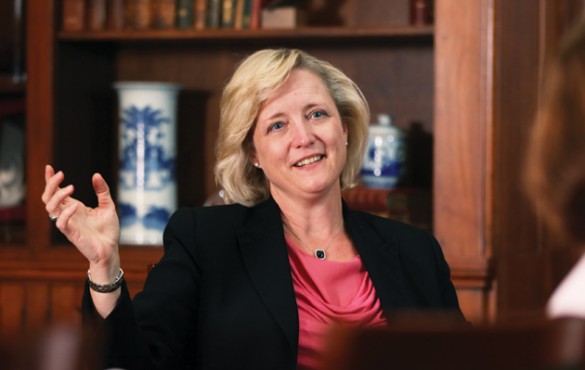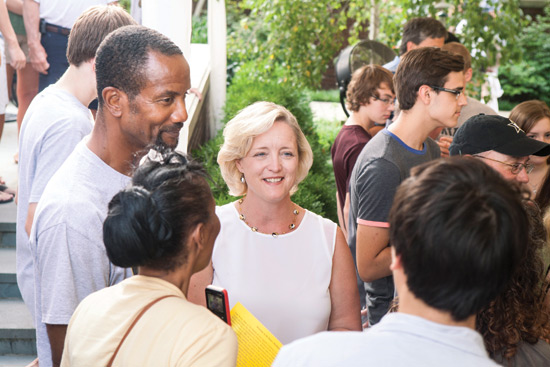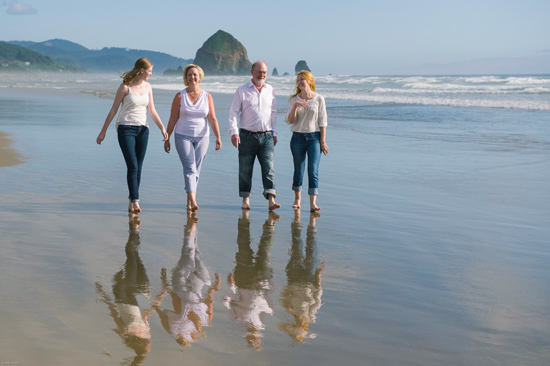In the fall of 1980, Susan Wente entered college with a plan. The forensic and drama talent she’d displayed as a high school student in Emmetsburg, Iowa, had earned her a college scholarship, but Wente had settled on an eminently practical course of study—dental hygiene.
Although her small high school hadn’t offered advanced placement classes, Wente had taken CLEP exams, standardized exams that allowed her to test out of whatever subjects she could in an effort to minimize her family’s financial burden.
Two weeks into her first semester at the University of Iowa, her plan hit a snag when her pre-dental hygiene adviser phoned.
“I noticed you didn’t register for freshman English,” the adviser said. “It’s a requirement.”
“But I tested out of it,” Wente explained.
It was a requirement, the adviser reiterated.
Back and forth they went in this “But I tested out of it/But it’s a requirement” loop, with Wente displaying the calm persistence that has been a hallmark of her career.
Finally, there was a long pause at the other end of the phone.
“I’ve looked at your record,” the adviser said. “We’ve never had a pre-dental hygiene major test out of freshman English. I think you should switch to an open major.”
By the end of the day, Wente, with the help of another university administrator, had swapped every class she’d signed up for with a more ambitious slate of courses. By the end of her freshman year, she’d found a discipline she loved—biochemistry and basic biomedical research.

That experience, and the profound change it signaled in her future, has left her with lasting lessons: “Aim high. Don’t worry if you change your mind about what you said you were going to be, because nobody will remember.”
And finally: Other people who go the extra mile can make all the difference in your life.
In April, Wente, a cell biologist who most recently served as associate vice chancellor for research and senior associate dean of biomedical sciences at Vanderbilt, was named provost and vice chancellor for academic affairs. She is Vanderbilt’s first female provost and the first university provost to have been promoted to the role from within Vanderbilt University Medical Center.
“[rquote]I love research,” she said. “But I have always been somebody who ended up organizing things and pulling people together.”[/rquote]
Even before her appointment as provost, Wente had been tapped to co-chair the executive committee of the university-wide academic strategic plan to set the course for Vanderbilt’s future. That experience underscored for her the need to create opportunities for scholars from diverse disciplines to be in the same room, “to understand each other’s common interests,” she said.
“Vanderbilt is so uniquely positioned to be more than the sum of our parts,” she added. “I think our One Vanderbilt culture allows deep and unique interdisciplinary collaborations to flourish with humanists, social scientists and natural scientists working together.”
As provost, she will continue to run her lab and pursue work aimed at furthering knowledge of the exchange mechanism for proteins and genetic material between the nucleus and cytoplasm. As Vanderbilt’s senior associate dean of biomedical sciences, she spearheaded the basic science education and postdoctorate training of more than 600 graduate students and more than 500 postdoctoral fellows and several trans-institutional programs.

Throughout her career, she has also demonstrated a deep appreciation for undergraduate education. “I view it as the foundation of a research university,” she said. “My own children are in college and high school now. The value of broad-based liberal education, and our need to have synergy and balance between the humanities and sciences, has always resonated with me.”
After completing her bachelor’s in biochemistry at the University of Iowa, Wente earned her Ph.D. in biochemistry at the University of California–Berkeley. At Berkeley she met the man she would marry, fellow graduate student Chris Hardy. She later did postdoctoral work at Memorial Sloan Kettering Cancer Center in New York in biochemistry and molecular biology, followed by another fellowship at Rockefeller University.
In 1993 Wente began doing research and teaching cell biology and physiology at Washington University School of Medicine. She was quickly promoted to associate professor.
In early 2001, Dr. Arnold Strauss, then Vanderbilt’s chair of Pediatrics, phoned and urged Wente to apply for the position of chair of Cell and Developmental Biology at Vanderbilt.
“I told him I wasn’t looking to become a department chair,” she said. Hardy, a geneticist, was also on the faculty at Washington University. They had two young daughters and a new house. Life was good.
“Then you can just use the interview process for practice for five years from now when you decide you want to be department chair,” Strauss countered.
By August of 2001, Wente was negotiating for the position.
“Then 9/11 happened,” she remembers. “I was supposed to travel in the next few days. I called it off. Vanderbilt offered to send a car for me, but I said, ‘No, we’ve decided to stay put.’”
Around Thanksgiving, Vanderbilt called again.
And in the end, Wente remembers, two things made Vanderbilt irresistible. The first was her confidence that Vanderbilt wanted her because she was the best person for the job—not simply because it needed a woman department chair. “Vanderbilt already had women chairs,” she remembered. “[lquote]This was clearly a progressive culture in terms of diversity in leadership positions.”[/lquote]
And the other lures? “Vanderbilt had a biomedical graduate program that was truly interdisciplinary and collaborative shared research core facilities,” she said. “They were also willing to take risks and be entrepreneurial, especially in trans-institutional arenas. The attitude was: You’ve got a great idea? Let’s try it.”
She signed on here in 2002. A few years later, she moved into the role of associate vice chancellor with the strong endorsement of her family.

“Chris has always been incredibly supportive of my career and has made sacrifices at many times for me to advance and keep our life centered,” she said. “Our daughters will tell you he’s the chef and I’m just the fill-in cook. He cooked for me on our first date. We just celebrated 25 years of marriage.”
From her research, Wente sometimes draws an analogy about spatial and temporal impacts that apply to her own life and the opportunities she aims to foster in other young lives.
“As cell biologists, we think about where difference activities occur within a cell and what is needed in terms of cell function or cell signaling or gene expression. In other words, it’s all about getting yourself in the right place at the right time,” she said. “At many points in my life, individuals gave me those opportunities.
“Now I have the opportunity to help other scholars get to that right place and time,” Wente continued. “We are teaching the next generation of leaders and creating environments for creative thought and research. In essence, from this discovery and learning linkage versus just my own research, I get to impact in a multiplier way that is immeasurable.”